#no I will NOT phrase it any other way
Text
Kwak Dong Yeon's ability to play poor little meow meow's should be studied. My god that mans dedication to being sad and pathetic is elite.
#and I eat it up every time#kwak dong yeon#vincezno#jang han seo#queen of tears#hong soo cheol#big mouth#monstrous#it's okay to not be okay#my strange hero#my id is gangnam beauty#love in the moonlight#doctor detective#yes I am including doctor detective because how are you gonna have such a devastating cameo#i love him your honor#poor little meow meow#no I will NOT phrase it any other way
49 notes
·
View notes
Text
Shipping is fun and all but I swear every single time someone makes a comment, whether as a joke or in a legitimate analysis, about there being "no other explanation" for a pair's interactions, I lose just a bit more of my sanity
Like, no, you guys don't get it. Romance is not about the Amount of devotion, it's about the COLOR. the FLAVOR of it all. a character can be just as devoted to their platonic friend as they are to their romantic partner, and they don't love either of them more, just differently.
But because the majority of people still have it stuck in their minds that romance exists on the highest tier of love, I'm stuck seeing endless takes that boil down to "these two care about each other too much for it to NOT be romantic" as if that's the core determining factor to how literally any of this works
In conclusion: stop telling me that I don't understand the story if I don't interpret the leads as romantic, I am TIRED
#analysis#meta#miscellaneous#fandom#shipping#media discussion#amatonormativity#lgbtq#I feel like tagging any of the fandoms I was thinking of when writing this would be a little mean-spirited potentially#Disclaimer: no one has actually been telling me personally that I don't understand any story in particular#It's just that the way people tend to phrase their analyses feels unnecessarily targeted at the reader and that's just. not great#even if I agree with every other point they make
21K notes
·
View notes
Text
i wonder how many more people would've vehemently hated gale right off the bat on full release if his introduction conversation had stayed like this or something similar
#i wasn't realy involved in any discussions during ea but i do know a lot of people didn't trust or like gale then#but i always really loved the wind imagery he uses with his phrasing here#and the way he casually walks out of the portal like it's effortless and then stands over you literally talking down to you#in the full release your first impression of him is a guy stuck with no way to free himself without your help#then when you do help him he's very friendly and kind and doesnt come across as threatening at all. and you talk to him on level ground#even his most dismissive remark about the player's magic or lack of it just after meeting him doesn't come across as strong as this one imo#also. i have like no other clips from ea saved other than this one lol#baldur's gate#gale dekarios#gale of waterdeep#★
823 notes
·
View notes
Text
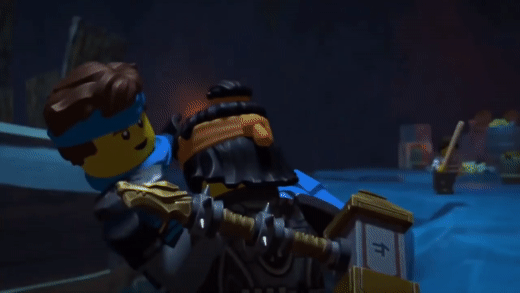
theyre literally dating. argue with the wall
#IF UR READING THIS I DONT POST NINJAGO ANYMORE PLS FOLLOW @LEGOGENDER INSTEAD#SORRY I JUST FIND THAT PHRASE FUNNY#idgaf what u ship or whatever#ninjago#geodeshipping#TAGGING IT LAWLLL i love this gif lets bring it back#when this aired i was screaming crying bringing houses down#until this we had had SCRAPS for ages#the one scne of jay holdinh cole in pe#or the other way round i forget#s11 was pretty good. for moments but atill only a couple#geode is so funny in canon it dropped off so hard after s10#probably also why its not popular anymore.. SAD!#s7 did any one watch s7. theyre SO real#s7 is GOOD btw guys you just hate joy and whimsy
613 notes
·
View notes
Text

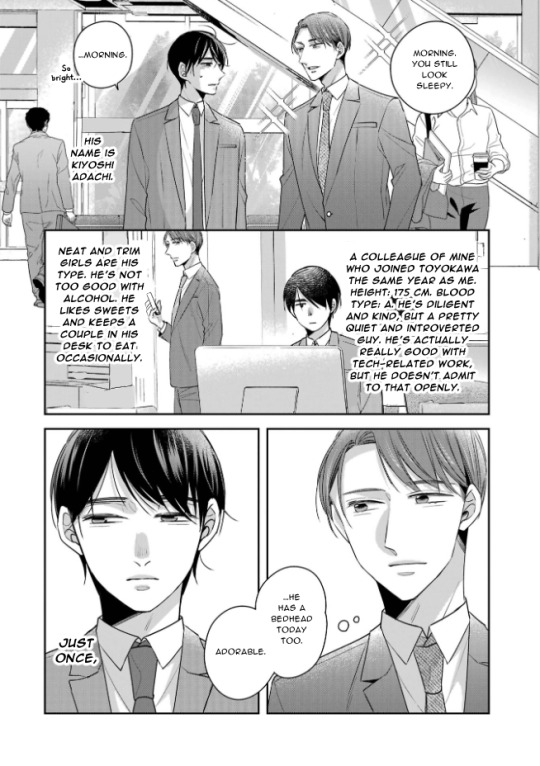
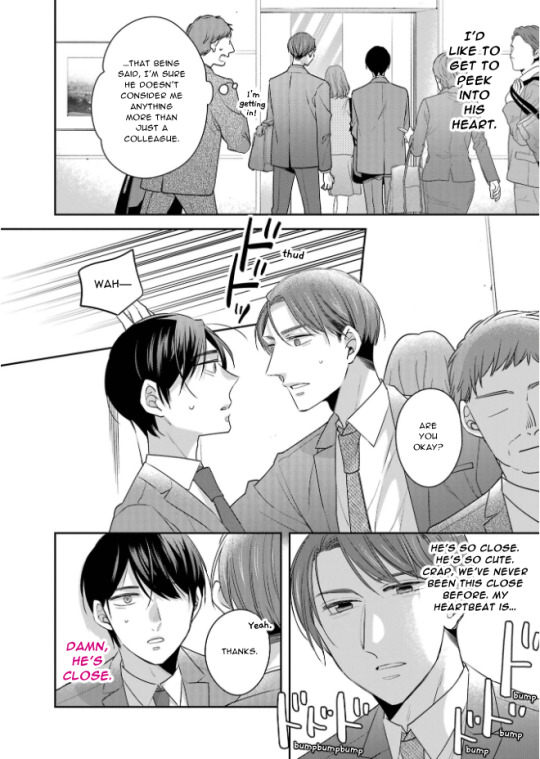
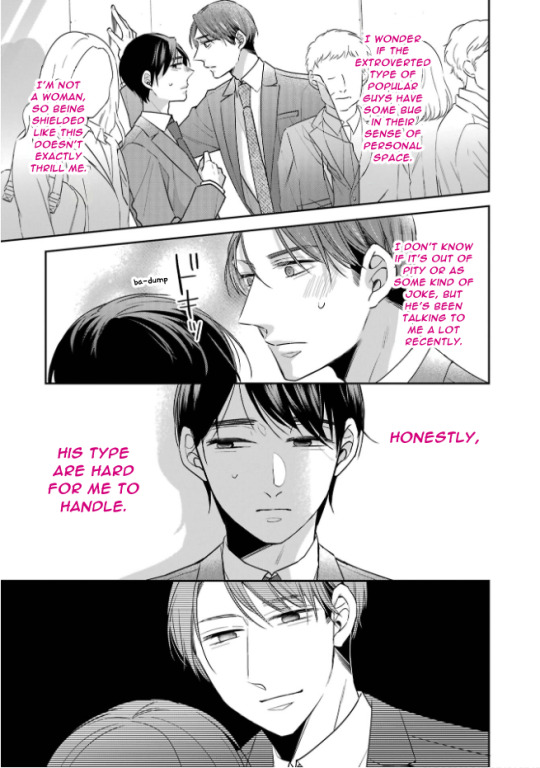
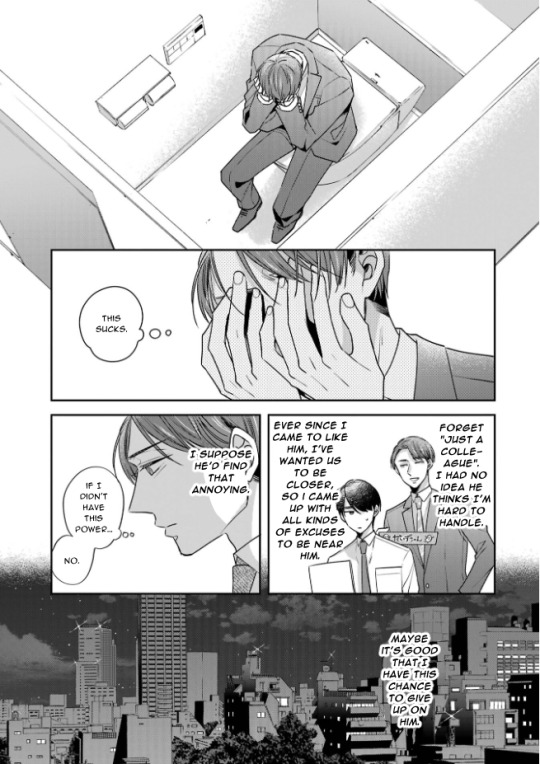


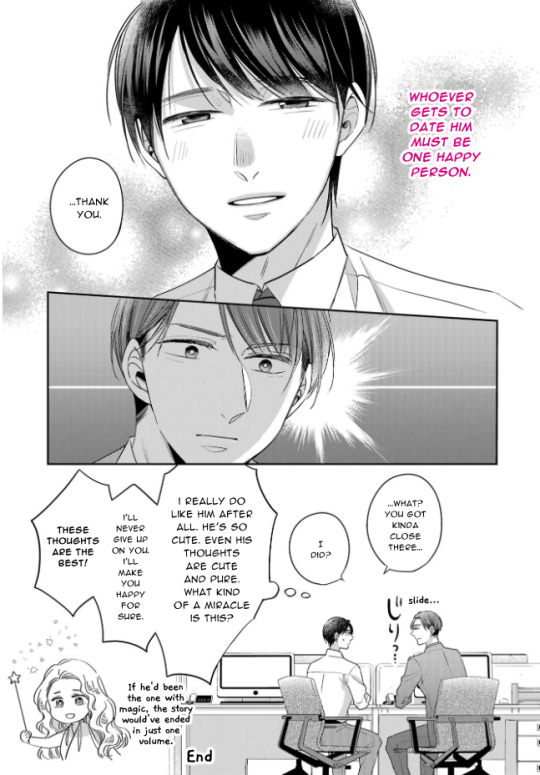
「30歳の童貞に片想いすると魔法使いになれるらしい」 (from cherry magic volume 11 special edition) — english translation
#cherry magic#my translation#finally. after months i got to read this at last !!!!!!! i can be at peace now#also gonna do a little t/n in the tags bc i wanna clarify one little bit#the term '苦手' comes up a bunch here and it can mean either 'not being good at smth' or 'disliking/hating smth'#and from my understanding when used for people it can mean either 'not knowing how to get along with someone' or 'disliking/hating someone'#so on page 1 kurosawa uses 苦手 to say that the other guy doesnt like him#and on page 4 adachi uses 苦手 too which kurosawa misinterprets bc he doesnt have all the context#bc adachi means that he doesnt really know how to interact with guys like kurosawa but kurosawa hears it as 'i dont like his type of ppl'#(which gets cleared up later anyway thank god . tho it did give us a funnie panel)#i couldnt find any word in english that worked with the same sort of double meaning as 苦手 so i tried phrasing it in a way-#-that would have that same sort of 'this can be easily misinterpreted' vibe . dunno if it worked but i tried kjfkds
359 notes
·
View notes
Text
If y’all wanna add either you’re general region, generations, and why you use the phrase in a reblog that would be cool to :)
#pole#restaurant etiquette#personally I say could I get… please/thank you#I say that because it sounds more polite and understanding to me#and I’m Gen z from the west coast in the us#but I’ve been told by others that this phrase is childish and that I will have.. is the proper way to speak#these people are older gen x and typically where raised elsewhere in the us so I’m curious to know#especially cuz I can’t seem to find any studies or articles about the subject
123 notes
·
View notes
Text

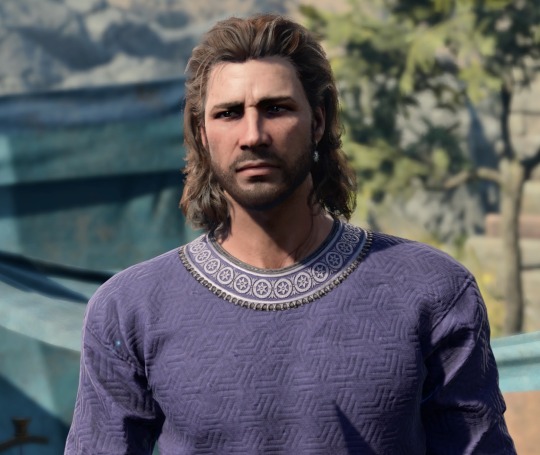
SOME ILLEGIBLE RAMBLES AND REFLECTIONS: ON GALE AND MYSTRA
I've been on the fence about whether to make this analysis specifically, but after seeing a few other discussions floating around figure it's worth offering another viewpoint in case it resonates.
These analyses in particular are very subjective and offer an interpretive option more than anything. I might allude to discussions I've seen elsewhere that I have different views from, but different views don't automatically mean personal dislike for me. Life would be boring if we all thought the same way, you know?
Anyway. Hugeass post ahead, proceed at your own risk lol.
One of the arguments I've seen cropping up recently is the idea that romance between gods and mortals is inherently unequal, abusive, and problematic.
I am very much of the mind that Mystra abused Gale. The developers at Larian have stated that every companion in Baldur's Gate 3 is a victim of abuse in some capacity. Some of my favorite romances over the years have been between gods and mortals. Mystra/Gale is not one of those.
I think blaming the divine/mortal dynamic for any abuse misses the point. Moreover, it absolves Mystra of a huge amount of personal responsibility in the abuse she committed. I think it makes the abuse focus on what she is rather than who she is, how she looks at others, and how she treats others.
I reflected on the divine/mortal pairings I've enjoyed compared to the dynamic between Gale and Mystra. In every divine/mortal romance I've loved, the god found wonder and saw a kind of power they lack in their mortal partner. This power stems directly from their mortality. There are experiences and perspectives specific to being mortal that are invaluable. The god doesn't relate to those experiences and perspectives the same way. The god always needs not only humility but equal respect for their mortal partner in some capacity. Additionally, the god acknowledges that being divine does not equate to omniscience. This is not a god according to the monotheistic definition. It's closer to an immortal being who excels in a very specific area and has certain responsibilities weighing on them. The god sees the forest but may no longer see trees, while the mortal sees trees but may not see the forest. There is value in what is ephemeral and fragile, just as there is value in what is permanent. The god and mortal need to bring balance to one another in the sense that the god helps the mortal find comfort in a bigger picture while the mortal reminds the god what it feels like to be small, vulnerable, and intimately connected to the world/other lives.
A healthy divine/mortal romance requires recognition of multiple forms of strength, intelligence, and value. That very, very much is not what Gale and Mystra had.
Another layer to the 'divine/mortal romance is always problematic' argument ties to questions of power imbalance. I would argue that even among human beings--power imbalance always exists. Human beings are not identical or interchangeable with one another. One partner might be brilliant at math and runs finances where the other partner would be lost. The other partner might be brilliant at people and can navigate social situations the mathematician would feel helpless in. One partner may be physically larger or stronger than another. The other partner has the full weight of social/legal support in most conflicts. And this isn't touching on issues relating to mental health, physical health, economic stability, societal issues, etc.
People are multifaceted. None of us excel at all things, find power in all things, or suffer all things. We each have our own pains and triumphs. We each have the ability to hurt each other if we want to. If we wanted to avoid any power imbalance in favor of 1:1 equality, the only answer we'd have would be to literally romance ourselves . And that's 1) narcissism 2) lonely 3) sad. Just ask Raphael.
But unhealthy power imbalances must exist, right? And there is a horrible power imbalance between Gale and Mystra. I would just argue it has more to do with them personally than because of Mystra being a goddess. I'd argue that we should be looking at Gale and Mystra not as mortal and god or man and woman, but as people above all else with their own experiences/motives driving choices throughout the relationship. Examine the ways they look at and treat each other versus themselves. If Mystra was the mortal and Gale was the god, if Mystra was a man and Gale was a woman, I would not change my stance regarding where abuse was committed. Imo people get too caught up trying to make sweeping generalizations instead of focusing on the individuals and how they specifically interact.
This in-mind, what are some examples of unhealthy power imbalance as I define it?
A character is physically and/or mentally incapable of participating with proper awareness of the situation, as a partner with equal respect and sway within the relationship.
A character is dependent upon the prospective partner for survival and cannot refuse them without fear of retribution or withholding necessities to survival.
A character is being systematically isolated and made dependent on their partner for all socialization and self-worth.
And so on. Hopefully you get the gist. What I do want to draw attention to though is that these examples offer room to include a variety of circumstances or dynamics within their umbrella. Ex. An underage character with an adult would easily qualify for the first criteria, but an extremely, non-functioningly drunk character would also count.
So lets have a look at Gale and Mystra's situation in particular again.
Gale has, by his own admission, been involved with the Weave for as long as he can remember. He sees Mystra as synonymous with the Weave, and with magic. These are things he explicitly states within the game. Gale also has notable reactions to say, saving Arabella from being killed over the idol of Silvanus or Mirkon from harpies. With Arabella especially, the idea of being treated as unforgivable or deserving death for a youthful mistake is something he talks about as if he has some experience with it. And while this is a video game with limited character models, I'm going to estimate that the tiefling kids are probably somewhere between nine and thirteen.
We know Gale has been stuck largely alone in his tower with the orb for a year or so. The orb specifically is something that happened when he was an adult, but the way he talks about Arabella with implicit personal identification of facing older authority figures as a young person who didn't know better... I don't think this is the orb alone troubling him. Minsc also has a dialogue option where he talks about how in Rashemen, boys with an affinity for the Weave were hidden away and he suspects it was to keep them from being preyed on by Mystra. Not men, boys.
I've seen people try to argue that Mystra would have been indisposed/dead and unable to take advantage of Gale when he was a kid due to the broader Forgotten Realms timeline. I'm inclined to say in this instance, with all evidence in the narrative pointing to a particular arc and theme for Gale and Mystra's relationship, it's more likely that the timeline was something Larian chose to fudge in the interest of storytelling opportunities. The alternative would be that none of those dialogue exchanges meant anything. The narrative is weakened if those moments are made meaningless, and the characters become flatter and less credible without them too. If it comes between trivia and the emotional core of a story, I'd argue the core wins.
Gale claims to have slept with other people before Mystra, but that a romanced character is the first person he's slept with after her. I personally suspect it wasn't a lot of prior experience, and he was pretty young when his romance with Mystra began. Additionally, while it's pure conjecture on my part--given how Gale reacts to the tiefling kids it would make sense to me if Mystra started grooming him when he was between nine and thirteen years old.
Other people have shared analysis pointing to evidence that Gale unknowingly dual-classed and was a storm sorcerer originally, but was told he was purely a wizard and then had all of his sorcerous abilities eaten by the orb without ever knowing they existed. I do think it makes sense for Mystra to influence Gale as a potentially very powerful sorcerer this way to 1) get him to self-limit through wizard spells so he's easier to predict and control 2) be completely dependent on and devoted to her, starting as early as possible.
(For the curious, sorcerer Gale theory is here and here. Very well-done imo!)
In any case, Mystra absolutely has personal motive to do what she did, that has nothing to do with Gale personally. That it turned into grooming for a sexual relationship isn't a huge leap in light of her apparent mindset either.
But lets take a moment to review that.
This is a really good recap setting up Mystra's situation. Karsus too, by the by. This second video here helps explain Mystra's own situation.
My understanding is like this:
Mystryl was the original goddess of magic. Mystryl was a born-goddess rather than an ascended mortal goddess, which is important to note because both exist in the Forgotten Realms. Mystryl was neutral alignment. The Weave, magic, and those casting magic all tied into her divine portfolio. Divine portfolios reflect deities' jurisdictions and callings, which empowers them through use in the world as well as mortal worship. With all this in-mind, naturally it benefited Mystryl to encourage experimentation, devotion, and arcane ambition. The more spellcasters pushed the limits of magic, the more powerful Mystryl became too. This was when the Empire of Netheril came about, with its floating cities and its magocracies. Worth noting, eleventh level spells were being used at this point in time.
Cue a bunch of aberrations showing up, called phaerimm. Cosmic horror monstrosities that sort of looked like if you combined grubs and lampreys then made them way too big. On the one hand they were ridiculously powerful natural spellcasters themselves. On the other, they could straight up detect, deflect, and eat magic at will. Incidentally they were also extremely hostile to other life forms. So them existing at the same time as Netheril caused some massive problems. The wizard empire was at war, struggling, and panicking.
Karsus was a prodigy and the one most people were turning to for protection at the time. Karsus decided the best way to solve the problem was to become a god himself using the first and only twelfth level spell (of his own design) then get rid of the phaerimm that way. The spell specifically required the caster to replace a god of their choice.
Karsus, being a wizard, thought Mystryl was the strongest divine force of all time and chose her.
The first video explained very well, but it basically sounds like as a born-goddess--maintaining the Weave was essentially an autonomic process for Mystryl. Basically required as much thought as beating your own heart. It wasn't like that for Karsus. Karsus might have been the best wizard in the sense that someone might be the best marathon runner of all time, but if you take that marathon runner and then tell them they have to pump their heart manually from now on they're not just going to lose any future races they attempt--they might just die on the spot.
Which is kind of what happened to Karsus. Karsus became a god of ambition along with magic, then lost his divinity to become a Great Old One instead. These days he's a stone stained in the gore of his dead people who speaks in fountains of blood.
(One of the reasons I'm not enabling Gale in his quest to become god of magic, by-the-by.)
Mystryl died because of Karsus's spell. Mystryl probably hadn't considered mortals, let alone the wizards who gave her so much power as a goddess, a threat to her personally before. An incarnation of Mystra (not Gale's Mystra) was born from the ashes of Mystryl to become the new goddess of magic.
One of the first things Mystra does after basically reincarnating from Mystryl is ban mortals from using magic at level ten or higher. Mystra is now aware that mortals can challenge the gods and straight up kill her personally. She still needs casters using magic at high level to empower herself as a goddess, but it's a double-edged sword that can absolutely kill her.
And to make matters worse... this Mystra also gets killed later. The Mystra we have now was a mortal woman (Midnight) who kept Mystra's name to avoid confusing worshippers, who'd been chosen by Mystra previously and ascended into that role. Midnight-Mystra, from the sound of it, also got killed for a bit and had to get saved by Elminster.
Like I said before, I do think there were some timeline blips going on for Mystra with Baldur's Gate 3. As long as she's died and reincarnated twice, her psychological state is cemented. How long it took her to come back and whether there were even more deaths than that is less important. I'd argue the key ideas we're supposed to take away about Mystra from this are that she is a goddess who 1) at this point is an ascended mortal who may have certain inherited memories or experiences from born-deities 2) is hyper aware that mortals can kill her 3) has been killed and reborn multiple times, not just by mortals but the very wizards she draws power from.
This is absolutely a shitty situation. It makes sense Mystra has complexes around it. It makes sense Midnight-Mystra would feel especially afraid when it comes to wizards seeing as she herself is a former mortal, so her position likely feels even more tenuous. The way she interacts with wizards and relates to her own position as a goddess is not as someone secure in her own power, but someone who sees anyone coming close to her level as a direct threat to her life. She needs casters to be strong to fuel her portfolio, but if they're too strong they can challenge her. So she is using whatever tools at her disposal to keep them beneath her while maintaining her own strength. It's also worth remembering that Mystra has no pretense of being good-alignment. Her motive in confronting the Netherbrain wasn't to protect Toril from mindflayers, but to protect herself personally from the Crown of Karsus and protect the Weave from the Karsic Weave. If magic as a force is in danger (as per the Karsic Weave) she might try to do something, but what befalls mortals is irrelevant to her. I'd argue she's 1000% acting out of self-interest for Baldur's Gate 3. And again--it makes sense given her position. It makes sense given the track record for gods in the Forgotten Realms.
So, if we go with the in-game implications that Mystra is supposed to have been active across Gale's life and was active when Minsc was running around a century ago (referenced in his comments about Rashemen protecting boys from Mystra)... what kind of relationship has Mystra built with wizards in particular?
This is heavy speculation here but I'm going off of Gale's experience, Elminster's behavior, a point of notable cattiness from Lorroakan, and Mystra's motives.
I think Mystra encourages wizards to compete for her favor, both through their arcane power and on a personal level. She encompasses their entire world and dictates everything they are capable of by holding the Weave in her portfolio. Casters are nothing without her. She is fickle in her attentions, moving between wizard paramours and chosen so they constantly feel the need to prove themselves worthy of her love. As their goddess, they have no room to question her or ask for loyalty born of personal affection. Mystra does not care. She is inherently more than they are and ever will be, and unless they have something to woo her through her portfolio specifically there is no reason for her to stick around. They're lucky she gives them the time of day. Even if she can't literally, physically, personally prevent a wizard from interacting with the Weave--she can seriously screw with them while they do. Mystra's first post-Mystryl act was to blanket-limit the spells wizards could perform, remember? And BG3 Mystra was able to pluck the orb from Gale's chest at any time, whenever she felt like it. She just didn't.
Lifetimes of work, dedication, study, and innovation are not ultimately credited to the casters who built themselves through their art but to Mystra. Memorized spells, arcane gestures, the interaction of components. She can make all of that so much harder. And she takes credit for any advancement a wizard makes. Origin Gale has lines with Minthara where he struggles to see himself as capable of anything without Mystra's say-so and needs to be reminded that she can't claim everything he has ever done through magic, and she hasn't managed to stop him yet. The fact that Gale himself, as Mystra's former lover, doesn't believe this initially and needs someone who very much is not a wizard to remind him says a lot about the dynamic Mystra set up with him and (in all likelihood) other wizards.
So how does all of this fit in with the grooming point?
Well, magic users are going to be much easier to psychologically control if Mystra starts taking advantage of them when they're still children and don't know any better. She needs to feed off of their strength with no risk to herself, so she needs to make sure they are can't even fathom turning on her. Maximize the power difference, ingrain that shit early. And if it becomes a sexual relationship... Mystra can tell herself they're even less likely to consider turning on her because it's just one more way they depend on her for validation.
Mystra's own fear and trauma (like Cazador's) does not prevent her from becoming an abuser. And like Cazador, she's using it to fuel the abuse she commits herself.
Something else I want to highlight before I segue to focus on Gale further, is how wizards deal with each other and why policy differs toward wizards versus other casters.
Wizards are nerds with shared interests. They're fucking around to see what's possible with magic and seem genuinely excited when anyone innovates. Innovation is something they can learn from and incorporate it into their own art. But actual wizard friendships, at least in Baldur's Gate 3, seem to be rare. They undercut each other emotionally and often look for ways to elevate themselves above their peers. Gale's colleagues left him to twist alone in his tower for a year. Elminster prioritizes pleasing Mystra by passing on her message for Gale to kill himself, and defends her if the player condemns Mystra's behavior. He even gets angry for certain dialogue options.
(It bears saying, I think Elminster has been psychologically wrecked by Mystra too. He does seem to be trying in spite of that but guy's not well himself.)
Even if not all wizards look to become romantically entangled with Mystra, Mystra has definitely encouraged competition and mistrust between them. After all, if the wizards supported each other they might realize they're stronger than her and that she's been causing harm. Another potential death.
I suspect the reason Mystra focuses on wizards is because wizards are ordinary people who know they were born ordinary, and know how hard it was to build arcane power. They aren't as secure in themselves as sorcerers who use magic like a reflex. And warlocks manage to work around Mystra with patrons who aren't beholden to her. So best for Mystra to undermine, manipulate, or otherwise occupy sorcerers who are strong enough to pose threats and teach the wizards they'd be nothing without her.
...
One of the other arguments I saw recently was that Gale was being disingenuous/lying to himself and the player when he claims he wanted to gift Mystra a part of herself back. That he only wants power for power's sake, is kind of a terrible person, and it would be boring if he was being genuine.
I deeply disagree with this stance.
When it comes to motivation, I'd argue power is by nature a means to an end rather than the end itself. "If I'm powerful enough no one will be able to hurt me again," "If I'm powerful enough I can fix every terrible thing I feel the need to," "If I'm powerful enough I can push the boundaries of what is possible and find a sense of wonder at the results."
Power because power does not cut it as a motive. It's likewise with ambition. We're not 2-D mustache twirlers here.
Ambition includes experimenting with a project to see if you can pull off something new or particularly difficult. Finding joy in the process and challenge itself isn't evil. It isn't even unhealthy.
Competing with others isn't necessarily negative either, in the right context. Being an elite athlete at the Olympics for example, you're putting your own skills against those around you in the hopes of surpassing them. It doesn't mean you think poorly of your fellow competitors. If anything, one would hope you respect them deeply for the shared discipline and passion. (But you still want to win, course. ;P)
If you read my post about DnD's pantheon, it's pretty clear I'm not opposed to the idea of A. firing gods from positions they're neglecting or B. nominating others to oversee necessary-but-unused portfolios. There are established gods of the Forgotten Realms who need, urgently, to be sacked. Being born into divinity, set up through nepotism, or 'elected by seniority' is not enough to shield a deity from my judgment. Mystra is abusing her worshippers, and while her portfolio might be able to squeak by I'd argue she's been compromised and is committing unprofessional and detrimental behavior in her capacity as goddess of magic. ESPECIALLY knowing she's like this as an ascended mortal. Any other mortal would be well within moral bounds to replace her. She has no ethical high ground in that regard. Managing autonomic maintenance of the Weave is an issue, but if someone showed up to replace her with the argument that Mystra is unfit due to committing abuse... I don't think that person would be morally wrong. Ballsy as hell, but not wrong.
So what's going on with Gale?
Gale canonically, in dialogue, thinks he and the world might both be better off if he was dead. I'll go a step further and argue that before the game even starts Gale considers his personal self a net-negative. If he isn't offsetting that with magical skill, knowledge, achievements, material possessions, and overall usefulness--he doesn't think he has a reason to be alive. The universe is worse for his existing in it.
Gale brags because he's trying to show he has something of value to give other people when he sees nothing of value in himself. He's trying to prove he can be an asset so others will keep him around. He brags notably less as he gains a sense of self-worth, self-confidence, and general support as acts progress. The times he gets snippy with other casters are because if he isn't the only and most useful magic guy to get something done, Gale thinks he might as well be thrown away. He is replaceable. He's also terrified to admit anything about the orb in Act I because there is no way to see it as anything but a danger and a burden. When that's added to his depression, he's sure he'll get abandoned in the wilderness to explode by himself and it might even serve him right. No one will mourn him. They might even be glad to be rid of the burden he brought.
Gale wants others to like him, to see him as a good person, to see him as someone brave and smart and worthy of trust. He absolutely does not see himself that way. If he's trying to prove it to the party--he's trying to prove it to himself just as much.
There's a line he can give with The Dark Urge where he comments that if people are being killed just for being annoying, he should be dead a thousand times over. If you get solid approval with him at the tiefling party, he'll admit he didn't have any friends before the game. And while I can only speak to a particular romantic route, in Act III he talks about having been told to his face at various points/in various ways that he's insufferable. He knows other people don't like him and don't believe in him. If bad things happen to him they probably think he deserves it. He might even think so too.
Gale doesn't see anything worthwhile in himself that isn't built through wizardry. It has to be because he was smart enough, worked hard enough, and showed enough character to earn his power. If it's sorcery (and this is only a standard he applies to himself) then all that effort he put in would become meaningless. He can't look at his personal self as having done anything deserving of value or respect if he's a sorcerer because magic was easier for him than other people. And if he can't provide any magic, knowledge, or resources at all then no one has reason to give him the time of day. People hate him. Mystra only paid attention for his abilities as a spellcaster. The mortal, personal aspects of him were things she put up with.
So forget power and ambition for just a moment. What does Gale as a person in that position, who feels that way about himself, actually want?
I'd argue that he probably just wanted to know the person he loved most actually gave a shit about him as a person. That he wasn't disposable or only worth as much as his skills and material possessions. I'm pretty sure he'd have wanted that regardless of whether Mystra was a goddess. Mystra both being the kind of goddess she was and the kind of person she was kept telling him he should be satisfied, that he shouldn't want any more than she was giving him. He can't climb any higher than her. No one can give him more than her. She is divine, she is the world itself.
Gale never felt loved in that relationship. Due to Mystra's abuse he got to a place where the idea of wanting to be loved back became sacrilegious. It meant there was something wrong with him, that he was arrogant and insatiable. How else could he feel utterly alone and unlovable with a goddess?
Gale desperately wanted to mean something to Mystra personally, so he tried to offer a gesture of love in her language. Something he thought would be valuable to her as an individual and something requiring a ton of arcane skill/strength to deliver. He wanted her to look at him like he was irreplaceable as a person. I genuinely don't think that's a power-hungry or ambitious thing to want.
Gale didn't understand the orb, and unfortunately for him he didn't understand Mystra either. She wasn't the wise and understanding goddess he thought she was. She never wanted an equal. She does not have it in her to love someone as such. The idea of equality, for Mystra, is something that must be crushed to preserve herself.
I figure that the Gale who ascends to godhood has accumulated a divine amount of stuff and power to compensate for his belief that lacking those things, he would be worthless. If Gale wasn't a wizard it might have been music, or writing, or fighting, or politics--any skill, influence, or resource could be used the same way. It’s not that ambition is inherently bad. It’s that for Gale, it’s unhealthy. The ambition isn’t for its own sake. He’s using it as a counterweight against his own sense of worthlessness. God Gale buries his problems instead of dealing with them. He will never know if a character who romances him only did so because they saw his potential and wanted to come along for the ride. He will never know if they'd have bothered to stick around if he was only Gale Dekarios, if he didn't have so much to offer them. He tells himself it's enough that they believed he could do it.
With the mortal Gale ending, we should note that Gale doesn’t need power to enjoy the study of magic if he’s healthy. His priority isn’t about pushing the limits of spells, making new ones, or making a name for himself. Given room to decide for himself, he just wants to uplift and share with others through teaching. His trends in approval and disapproval support this preference too.
For Gale, I really think ambition and power are crutches he uses to justify being alive because he doesn't see any other reason. Give him a reason and he genuinely doesn't need them. They're the means, not the end. He does not want power for the sake of power. Guy is sad and doesn't know how to live with himself. He's not a worse or less believable character with that being his motive. Stories are about people, and people don't move through the world with static 'flaws' and 'virtues' checklists that need to be balanced. There's nothing inherently deeper or more meaningful about villainous characters compared to heroic ones. People make choices and deal with situations according to their experiences moment to moment, trying to make sense of things as best they can throughout their lives. Gale fits perfectly within this. The other cast members do too.
And for the record, while I'd argue Karsus was far more ambitious in character than Gale--even for him, it wasn't just about power. The guy was trying to save his people. He fucked up in a horrible and traumatic way so he's a Netherese blood fountain now.
(RIP Karsus but also someone please pact with him.)
And as one last, controversial section... what did Gale's experience with Mystra do to him when it comes to his relationship with sex?
From how Gale talks about and shows Weave-sex, I'd argue it's an extension of him feeling inadequate as a mortal. And knowing this is a controversial point + a lot of people have done and loved the Weave scene because it reflects Gale's love of magic, I offer this:
Gale would not be less worthy of love if he didn't have magic. Gale does not know this about himself. He went from an archwizard with a tower and Mystra's chosen to a level one adventurer sleeping on the ground. His entire relationship with magic for much of the game is incredibly unhealthy because he sees the person left in its absence as worthless. For Gale to have a healthy arc, I'd argue he needs to learn how to look at himself as nothing but a man and know he's still precious and irreplaceable. He needs to learn that he doesn't need to prove he deserves to be alive. He isn't disappointing. He doesn't have to try to impress others all the time to have a place in their worlds. He doesn't need to bribe people with shiny things or unique abilities so they'll tolerate the rest. He can exist as no one and nothing but himself and be treasured just for that.
I think at some point Gale could potentially have sex in the Weave again as a repairing experience where he's confident that his physical body, his reactions, and his wants weren't anything to feel ashamed of. Reclaiming that from his experience with Mystra could be very powerful and sexy. But for the first time he has sex since Mystra, when he thinks he's going to need to kill himself any day now and has been struggling between terror and self-hatred, I personally think it's healthier for him to get the validation of being enough as just Gale. Not the Wizard of Waterdeep. His life isn't being advocated for because he's strong or unique in bed. Someone wants him alive as just a person.
And not for nothing... I'm saying this as a writer who can't not write. I've had to do my own share of reflection about how I look at myself if writing isn't the metric of my worth. I wouldn't think Gale needs to abandon all magic any more than I would need to abandon all writing. But it's really important to know we aren't empty trash without our callings, you know?
Before I end this post, I do want to invite readers to think back to those bullets I made before on unhealthy power imbalance.
A character is physically and/or mentally incapable of participating with proper awareness of the situation, as a partner with equal respect and sway within the relationship.
A character is dependent upon the prospective partner for survival and cannot refuse them without fear of retribution or withholding necessities to survival.
A character is being systematically isolated and made dependent on their partner for all socialization and self-worth.
If Mystra deliberately started grooming Gale from a young age, emphasized and exaggerated the power discrepancy rather than making any effort to close the gap, that's a pretty big deal. Gale definitely never had equal respect or sway in the relationship compared to her. She'd probably find the idea insulting in the face of her godhood. She didn't want a partner but a supplicant who obeyed her with no needs for himself. Mystra actively distorted Gale's sense of boundaries and magnified what she could take from him if he displeased her. His life's work, his ability to access parts of his own mind for spells, his means of functioning in the world, his ability to defend himself... but also? His health and survival, once the orb was brought into play. And socially, Gale was incredibly isolated. It sounds like he hasn't even seen his own mother in at least a year, which I have some thoughts on. He was friendless for a long time even as Mystra's chosen. And Mystra made sure other wizards knew when she abandoned him to the point that even Lorroakan was aware. Mystra's offense was something for others to look down on him for. And Gale struggles in-game with the idea that Mystra mistreated or neglected him--because how could a goddess, his goddess, do that? He's been gaslit so hard that he doesn't quite get a moment of fully realizing it wasn't his fault. In some dialogue options Mystra even tries to frame his trauma over her abuse, unaware even that he had the Karsic Weave inside him, as wallowing in self-pity.
Gale did make a mistake, but I'd argue it matters a lot that the mistake was innocent and that he's woefully misjudged Mystra's character. He's being told it couldn't have been innocent and he deserves to be punished for it. He largely believes that. Doesn't make it true.
#Gale Dekarios#Mystra#baldur's gate 3#baldur's gate iii#bg3#bgiii#warning to readers there are strong opinions in here that I am very aware not everyone will share#it's okay if you have a different take and I tried to be careful about how I phrased things#I also didn't scour for all of the direct quotes from the game this time and for that I plead laziness lol sorry#I can try if there are specific moments people want to pick over#but yeah this is in the spirit of reflecting and discussing a character I adore + find really interesting for Gale#along with a character I find really psychologically fascinating and subtle as a villainess for Mystra#people are going to read both differently in places and I genuinely am not looking to fight about that#Just explore how I'm reading things + why in a way where other people are welcome to join if they wanna#If I mixed any lore details from outside the game apologies!
66 notes
·
View notes
Text
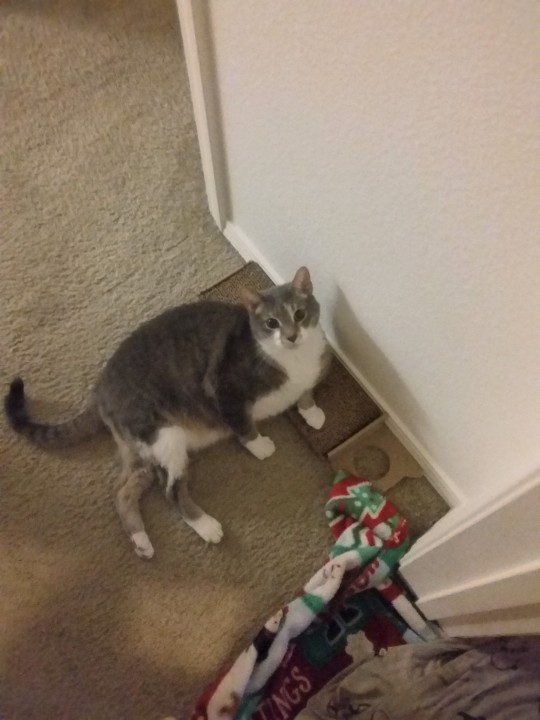
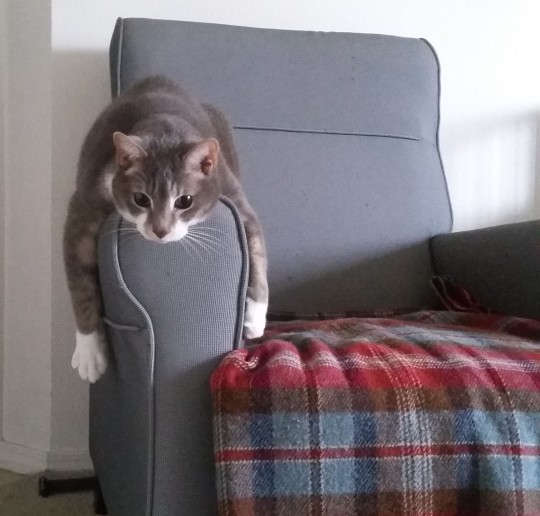
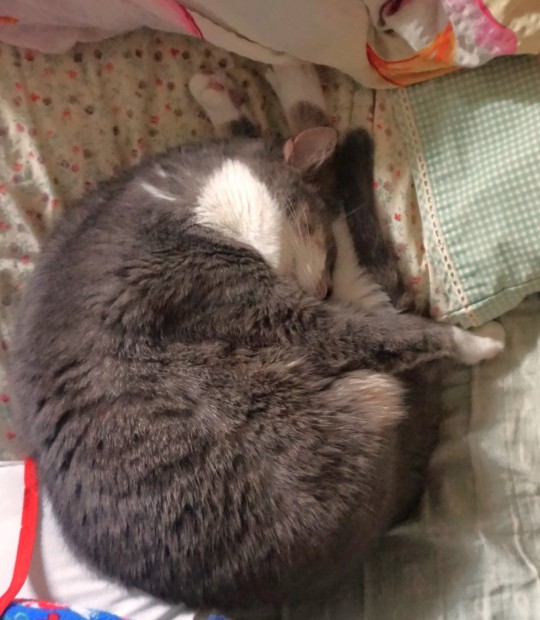
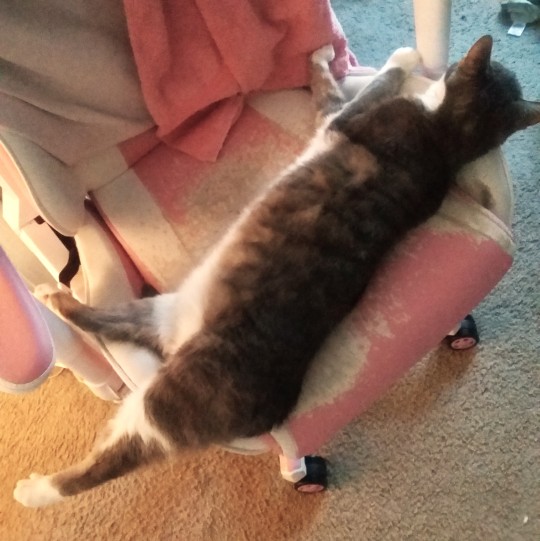
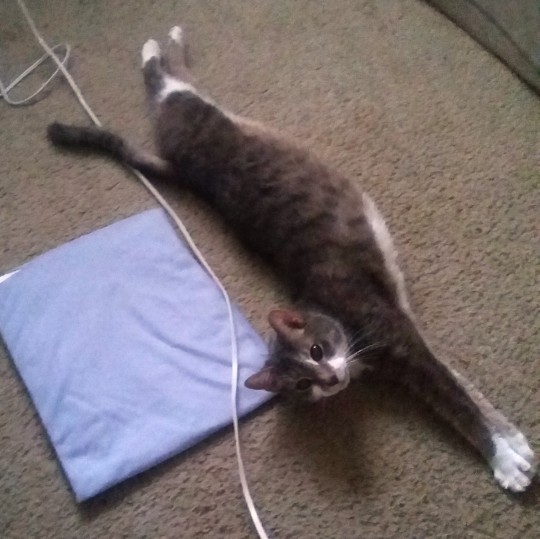
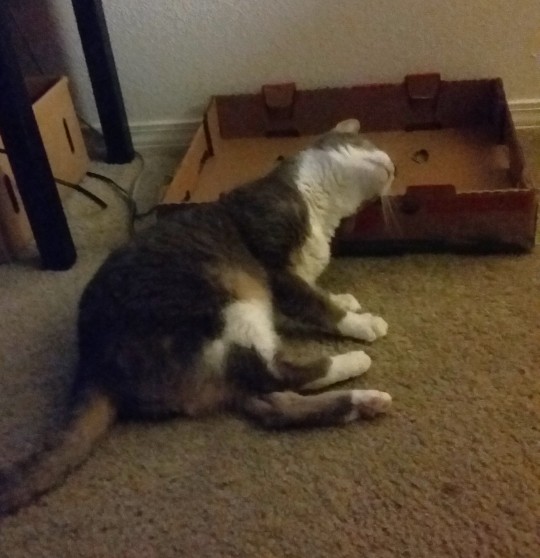
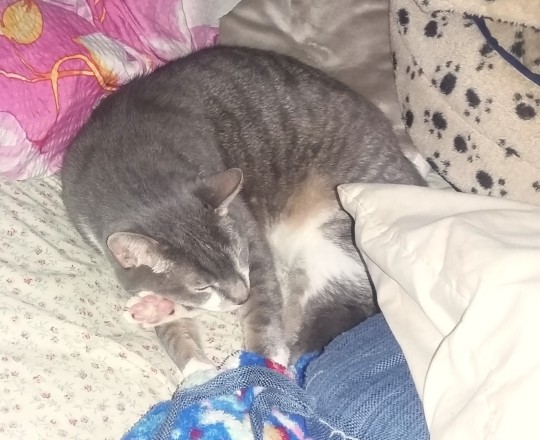
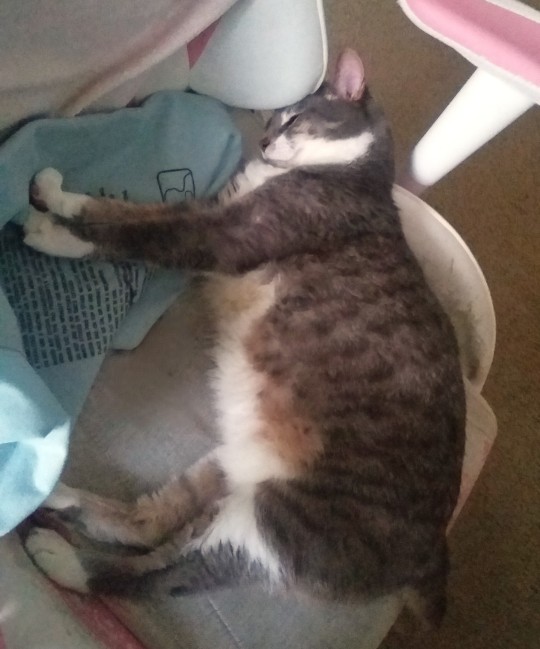
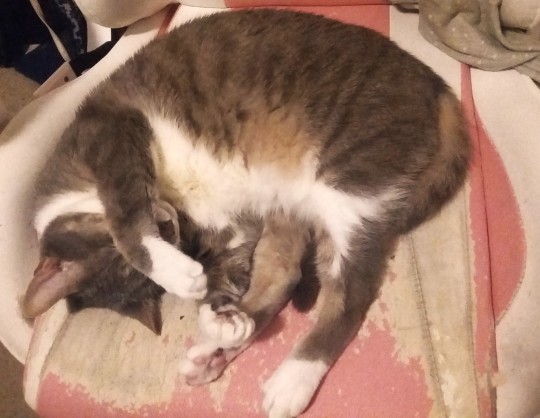
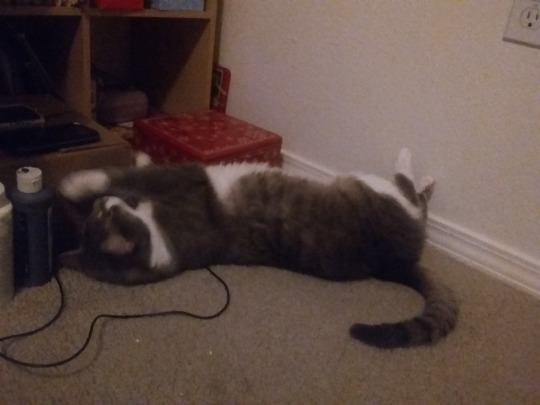
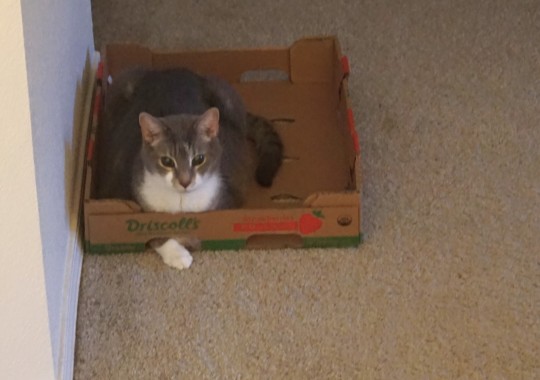
boy in silly sitting positions compilation
#cats#I especially like the last one where he just has one single paw poking out of that box for some reason lol#I still have costumes to post and like a billion other things.... grr... constantly failing at staying active on social media aughh#I think because currently my Main Focus is on trying to get my game done and stuff.. which basically just means sitting and writing all day#so there's not much to post about. Though I know the Good At Social Media thing to do would be to post about the#writing and share progress and talk about the game and characters or whatever to try to build interest or something but that is SOOO weird#to me.. I could maybe get it if it was like a tiny tiny discord groupchat of playtesters with like 5 people in#it.. But something about talking openly about things before they happen is weird to me?? Like presumptuous feeling or something#''oooo guess whats gonna happen LATER!!!'' like.. how do you know.. what if it doesnt. what if you dont finish it. what if its not the way#you think it's going to be. what if something changes. etc. Like I literally avoid movie trailers and game trailers for the same reason ghj#Even if it's not ME doing it it just feels... weird.. Maybe it has to do with my OCD and how I just don't like talking about ''future''#things in Certain Terms. Like if I was going to say ''Oh yeah sure. come over to my house in a few months''. I would have to follow it up#with like ''HOPEFULLY you can come over to my house in a few months'' or 'They'll come over in a few months MOST LIKELY''. Because just#stating that something will happen matter of factly takes for granted like.. what if somehting horrible happens and I DONT have a house#in a few months? or what if something bad happens to me. or to the person coming over? I can't ever DEFINITELY say with 100% certainty#that one could ACTUALLY come to my house in a few months. anything could change. So I have to allot for that in my phrasing. hbjjkn#There are a lot of situations where you're expected to just Assume Things but for some reason that bothers me. My brain literally does not#even Assume the most basic things.. like how do *I* know that just because it's someones birthday that they want to be wished a happy#birthday? what if they dont? everyone is different and has different preferences. I should check with them first. or wait until they public#ly announce that theyre accepting birthday wishes. I have to allot for all 5034859069 rare possibilities at any given time and never take#anything for certain. etc. ghjbjhbh.... ANYWAY.. I have been feeling a bit sick lately as usual.. but still slowly making progress on some#things. Moslty I need to edit costume photos. make sculptures. and work on the game. Going back reading some of the old writing from like#2018 and suprisingly I don't have to change that much of it? In fact I like it mostly. so that's good. I would be very interested if I were#playing the game myself. Though that doesnt mean much since my tastes are so niche lol..#Still really want to clear some of my million tumblr drafts as well... alas and aughh and ooughh and so on and so forth. Between all of my#evil appointments other such things...why cant I have one billion dollar to retire into relaxed hermit artist life of no stressors.. bleas
23 notes
·
View notes
Text
people who are saying 'no' on that "is listening to an audiobook the same as reading?" poll are super annoying and i hate that we have this same discourse every couple of weeks but it's reallyyyyyy interesting to me that so many people are saying that you aren't 'interacting' with the story in the same way because, the inherent ableism of that aside, you absolutely can analyze and think critically about a story even if you don't physically read it. you can listen to a story and think deeply about it and i think you're all very very weird to believe you can't. just because you only half-listen to things doesn't mean the rest of us don't pay attention and think deeply about it.
#i think a lot of this comes down simply to people thinking of reading (or engaging with any sort of art) as#'consuming content' (ugh i hate that phrase) and this strange sort of superiority some people have about how they#'consume content' (ugh!) in a better more intellectual way than other people#these are the same sort of people who are like 'reading [genre i don't like] isn't really reading!' 'reading more than [x] number of books#year isn't really reading!' 'listening to an audiobook is the same as watching the movie instead of reading the book' like do you think#before you speak? are you listening to yourself rn? who died and made you king of reading????? you are not better than other people lmao#anyway i'm just annoyed goodnight tumblr#personal post
37 notes
·
View notes
Text
i really like the theming of unfairness throughout fhjy so far.
the bad kids having just saved the world, driving 48 straight hours, and still having to go to school that morning
riz having to work multiple times as hard, taking on a shit ton of extracurriculars to have any shot of being able to go to college, just by virtue of he and his mom’s financial situation
adaine being expected to source ten fucking barrels of diamonds (and various eggs) for wizard class, with no aid systems in place for students who can’t afford that
fabian coming home to his mother and gilear taking off pretty much immediately and indefinitely, leaving him alone in his huge house unable to locate the non-milk food
fig and her sudden onset gilear vibes, and being culpable for the debt of her tour being cancelled due to the world needing to be saved
gorgug having to work a 400% academic courseload to multiclass because porter can’t see his aptitude, taking personal issue in the way gorgug deviates from he feels barbarians should be
kristen having the mortality of her god on her shoulders while being a spiralling teenager, and cassandra having her mortality on the shoulders of her only cleric, a spiralling teenager. the trail-off on her “It just isn't f... It just doesn't feel f...” during the mall battle…
kipperlily’s whole deal about campaigning for fairness yet taking pride in taking advantage of loopholes, and stomping rats daily for years with the rest of the rat grinders
shit’s really fucking unfair!
#very 11th grade. thats… yeah. shits unfair#i think it ties in super well with the other themes of doubt and rage too#d20#fh#fhjy#rambles#there’s probably a better way to phrase fabians deal#i guess it’s the lack of any parental support? being entirely at the whim of his own unfair expectations for himself#the pressure of societal expectations too#yeah i mean i guess fabian doesn’t really have much of a support network atm.#and he won’t open up to the bad kids about not wanting to be alone or needing help
46 notes
·
View notes
Text
the "big picture" - whether that refers to some detached, calculated greater good; ruthless ambition and progress for the sake of progress; or even the dear listeners' cosmic indifference - as an antagonistic force in wolf 359 is so fascinating to me because of the way eiffel as a protagonist is set up to oppose it, just by nature of who he is. eiffel retains his humanity even under the most inhumane circumstances. his strength is in connection, and with that he's able to reach others who share his core values, but he's operating under a fundamentally different framework from the show's antagonists. he can never understand where they're coming from or be swayed by their points of view because, for better or worse, he can only see the world through a close personal lens.
it's an ideological conflict he has with all of them, but notably with hilbert: "you talk about helping people, but what about the real, live people around you? [...] that's your problem. you're so zoomed out." eiffel will never, ever see that "big picture" because he is so zoomed in. at his best, he puts things into perspective and grounds the people around him. at his worst, his perspective narrows so drastically inwards that he becomes blind to everyone and everything else. his failings are deeply, tragically human - they're personal, they're impulsive, they're self-destructive. they're selfish. no matter how much he might try to narrativize or escape from himself, he's still left with doug eiffel: "it's taken me this long to realize that running from everyone else means that you're alone with yourself." eiffel could never be convinced to harm others on purpose, but he has hurt people, and it's never been because he didn't care. the very fact that he cares so much, that he's incapable of reconciling the hurt he's caused with the things he values, is what keeps him from real growth for so long. where many of the other characters in wolf 359 will justify their cruelty in service of something they consider more important, eiffel is so caught up in vilifying himself and the fear that he's always going to harm the people he cares for without meaning to that he shuts himself off from the people who care about him and perpetuates his own self-fulfilling prophecy.
#wolf 359#w359#doug eiffel#someday i'll finish my essay about the big picture as an antagonistic force. it's only been on my list of things to do for uh. ever#eiffel really cannot be convinced by Big Picture ideology in any form because he's so. unambitious and inwardly focused#he's not self-reflective at ALL but he is self-centered#and in some ways that's genuinely a good thing#but it's interesting. that he vilifies himself and tries so hard to. externalize his redemption and see some humanity in others#as proof he might be able to be better. when if those people consider themselves villains at all then they consider it necessary#i'm not sure if i'm phrasing this the way i want to but his worldview is just. fundamentally incompatible.#when i think about eiffel i think a lot about. how self-loathing is also a kind of exceptionalism. considering yourself uniquely bad#is its own way of avoiding accountability.#idk. it's complicated. it's a lot. it's interesting that lovelace talks about the 'big picture' when she's briefly a sort-of antagonist#but her 'big picture' is personal and emotionally driven in a way no other use of the phrase is#and then of course you have hera in am i alone now. such a big big universe etc.#when she betrays that perspective immediately and directly by talking about it through such a narrow personal framework#one of the most direct examples of 'big picture' thinking vs. personal connection in that contradiction. but that's another post maybe.
231 notes
·
View notes
Text
the way elmike had the possibility of a very close and real and intimate friendship stolen out from under them because of heteronormativity telling them the only way they were meant to fit in each other's lives was romantically, even though neither of them truly wanted that... pushing them further apart... tragic. literally so tragic
#what am I ON tonight someone get me help since when do I care this much about the 2 of them#no but literally. season 1 they're understanding each other so well... it warms a bitch's heart#like truly it's the foundations of something so sweet but then everyone is telling them it must be romantic#and it sours it. now they're no longer just 2 people with a budding friendship#now they're a Boy And A Girl and The Boy And The Girl and can it get any more obvious?#and then in s4... they're both gripping so tight to a dead thing because they've never allowed their relationship to be anything else#they've never BEEN allowed to BE anything else#SO THEY'RE CONVINCED THAT IF THEY WANT TO BE IN EACH OTHER'S LIVES AT *ALL* IT HAS TO BE ONLY THAT WAY#THAT'S THE FUCK OF IT ALL#sorry that's my new favorite phrase all of a sudden#BUT WHAT. SORRY LIKE BEAUTIFUL ELMIKE FRIENDSHIP KILLED DEAD IN THE WATER BECAUSE OF FUCKING HETERONORMATIVITY#stranger things#el hopper#mike wheeler#elmike
115 notes
·
View notes
Photo

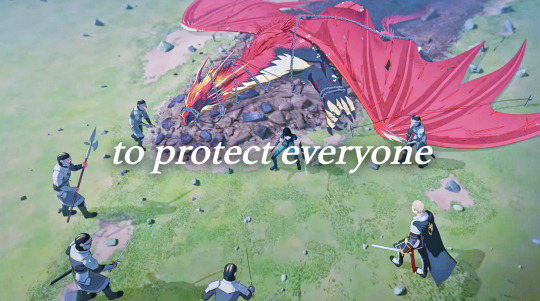
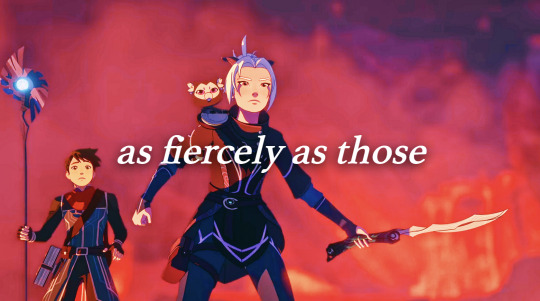





Those you hold close
But you’re just as devoted, and you don’t have to kill anyone or possibly leave to get killed. Sometimes helping others requires great feats of strength, Rayla. But you are right. Sometimes an act of caring is as simple as being there when it feels like no one else is. Both are necessary.
#rayllum#rayllumedit#book quotes#tales of xadia#bloodmoon huntress#every separation is a link#multi#arc 1#arc 2#parallel phrasing my beloved#parallels#thinking about rayla's 'i have to be strong' 'maybe the fastest & strongest of any of us' 'rayla is selfless strong & caring'#the way rayllum seamlessly embodies the both are necessary not only as a couple but having the capacity for both within themselves#even if one probs leans more than the other#LET THEM DOOM AND THEN SAVE THE WORLD TOGETHER I THINK IT'D BE NEAT#my edits#graphics
78 notes
·
View notes
Text
I am legitimately devastated to learn that “women are my favorite guy” isn’t yet another phrase spawned by tumblr meme culture like I assumed it was, and that it actually originates from a song created by some cishet white guy named Kyle who has built an entire tiktok career off of making fun of neurodivergent people.
#I’m not gonna listen to the song bc it’s either going to be dogshit and I’ll hate it or it’ll actually be good and I’ll hate it#how can a phrase so bisexual have such shitty origins#this guy was just smashing words together and accidentally described like half my sexuality#worst case scenario he thought it was funny because ‘associating women with non women things funny nyuck nyuck nyuck’#I haven’t actually watched any of his tiktoks and normally I would before making a post like this#because going off of what other people say they include I’m pretty sure watching them would be an incredibly upsetting experience for me#like normally I’m pretty thick skinned when it comes to shitty jokes#but this just hits way too close to home#as someone who was socially ostracized as a kid because I was neurodivergent and was painfully aware of how other kids viewed me#dj crazy times#kyle gordon#tumblr meta#anna talking about stuff#women are my favorite guy
66 notes
·
View notes
Text
the Grand Three? Nah, the Murderous Three... am i right?
because they all tried to murder each other (or other innocent people in audrian's case) at some point... right?
Runa - "killed" Audrian when he tried to bond with Dimondaise
Cyril - challenged Runa to a duel to the death
Audrian - fought Runa and Cyril with no mercy when they tried to stop him from bonding with Dimondaise and killed other innocent people and, oh yeah, he killed Grusha
also if i missed out on anything - add onto the list of murders!!
#wilderlore#the grand three#runa rasgar#cyril harlow#audrian keyes#i might have been thinking about this for a long time#or at 12am when i can’t sleep#idk though#the last line sounds weird but i honestly did not know how to phrase it any other way
13 notes
·
View notes
Note
Undertale did exactly that - I'm pretty sure theyre made by the same creator, Toby Fox.
Undertale, among many, many other things, is specifically designed to challenge modern AAA game structure and break away from the norm of video games. Its not just that you can befriend your enemies and you get punished for fighting; each different monster has unique, endearing possibilities for friendship. You jiggle and dance with slimes, there a frost-bird that tells terrible jokes, one monster desperately wants compliments on their hat. Each one is utterly unique.
There are three unique paths. Pacifist means you dont kill anyone. Neutral is the standard "kill when you have to/im used to video games where you kill every monster you encounter". Then there's Genocide.
There is a unique route where players methodically and maliciously clear every region of every living soul.
All this to say - in an age where most games allow you to murder monsters, enemies, or people for rewards, Undertale (and assumedly Deltarune) treats such behavior with humanity and empathy and the correct amount of abject horror that such actions should warrant.
okok yeah that definitely aligns with what i know/remember of undertale, and i do know toby fox made both games
the weird thing for me is that i’m not really familiar with the norms undertale was subverting
all the characters being unique and possible to either fight OR befriend resulting in different consequences seems completely reasonable from my perspective, i never had a reason to expect anything else
#splashasks#itsthenars#i will say the punchy eloquence of the way you phrased all this does kind of make me nervous#that i’ve stumbled into an argument that’s gone places i was not accounting for and don’t have the context to engage with properly#not to discount the possibility that you’re just a good writer ofc#but if people start having arguments with each other in my inbox i’m not answering any more asks everyone got that
20 notes
·
View notes